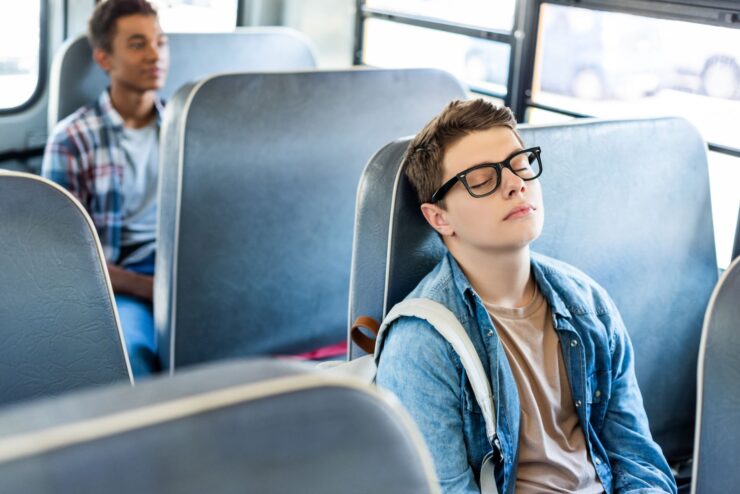How schools can adapt to teens’ sleep rhythms
Working with, not against, teenagers’ body clocks can yield academic and emotional benefits

Not sleeping enough affects not only how we feel, but how we think, learn, and live. While we sleep, our brains process what happened during the day, both in our social environments and within our bodies.
Why teenagers need more sleep than adults
During adolescence, a lot is going on: hormonally, emotionally, socially. It’s a phase filled with challenges and changes, which is why sleep is absolutely crucial. The teenage brain needs to rest and process what’s going on. Despite needing more sleep at this stage of life, many teenagers don’t get enough. They have to wake up early for school, which often prevents them from getting the recommended 8 to 10 hours of sleep each night.
“Despite needing more sleep at this stage of life, many teenagers don’t get enough.”
The mismatch between social and biological clocks enlarges in puberty due to hormonal changes, especially a shift in melatonin release affecting the body’s sleep schedule. Our bodies release melatonin when it gets dark, making us feel tired. We stop producing melatonin in the morning when it’s bright, and this helps us to wake up. But in teenagers, this melatonin release happens more slowly, so they don’t naturally feel tired in the evening, and thus fall asleep later.
A clash between teenagers’ body clocks and school clocks
On the weekend many teens sleep in, not because they’re lazy, but to compensate for the sleep deficit they have accumulated during the week. Similar to the travel jetlag that happens when we fly across time zones, teenagers experience what is known as social jetlag. This is because the social clock – with early school start times – does not align with a teenage body’s natural clock. Social jetlag can lead to fatigue, poor concentration, and a need to rest, and is linked to school performance problems, emotional challenges, such as anxiety and depressive symptoms, and even a higher risk of obesity.
How schools can work with teenagers’ body clocks
Schools can create a learning environment that works with, not against, teenagers’ natural rhythms. Several pilot projects have tested later school start times: Some have shown clear benefits in school performance and attendance, even when the start of school is delayed by only 30 minutes. However, other studies have seen little change in teenagers’ academic performance. Often, structural challenges like bus schedules or after-school activities make it hard to fully implement a change in school schedules. While schedule changes could be effective, they are difficult to implement in practice.
“Schools can create a learning environment that works with, not against, teenagers’ natural rhythms.”
In any event, schools can help raise awareness and teach sleep health literacy to students and parents. They might host information events for students, parents, and teachers to explain social jetlag, the importance of sleep, and how teenagers can improve their sleep habits. For example, simple behavioral changes such as engaging in regular physical activity and reducing screentime before bed can improve sleep quality. Helping teenagers, parents, and teachers understand the biology behind teenagers’ sleep needs can reduce potential conflict between adults and students.
Schools can also make a meaningful difference by thoughtfully shaping how the school day begins. Since most students are still tired during the first few class periods, the school day should start gently, with easier tasks and without exams or activities that require top performance right away. More daylight in classrooms can also help, so ideally the blinds on classroom windows should be open to let in natural light. If that’s not possible, bright ceiling lights are a good alternative. Bright light supports the body’s circadian regulation and helps students feel more awake during the day. Finally, schools should encourage movement during breaks and after school, because being active helps keep the sleep-wake rhythm in balance and makes it easier for students to fall asleep at night.
Taking teens’ sleep needs seriously and supporting students in school can make a big difference. Helping them get enough sleep and working to accommodate their body clocks can benefit them academically and emotionally.
How to help teenagers develop healthy sleep habits and cope with social jetlag
• Share information with teenagers about social jetlag, sleep hygiene, and the biology of sleep in adolescence.
• Start the school day with the least demanding tasks.
• Make sure that classrooms have access to daylight or bright overhead lighting.
• Encourage teenagers to engage in physical activity during breaks and after school.
• Encourage them to avoid screentime just before bed.
Further readings
• How does sleep affect neuroaffective development from early to late adolescence?
• Does social jetlag in school-aged children and adolescents vary by sociodemographic factors, and sleep habits such as bedtimes and electronic media use?
• How effective are school-based interventions in improving sleep among adolescents, and what strategies show the most promise?
Footnotes
This article is part of a BOLD series of articles written by master’s students in Psychology from the University of Zurich in a seminar on ‘Risk and Protective Factors for Youth Mental Health’ taught and supervised by David Bürgin from the Jacobs Center for Productive Youth Development (JCPYD) of the University of Zurich in the Spring Semester 2025.




